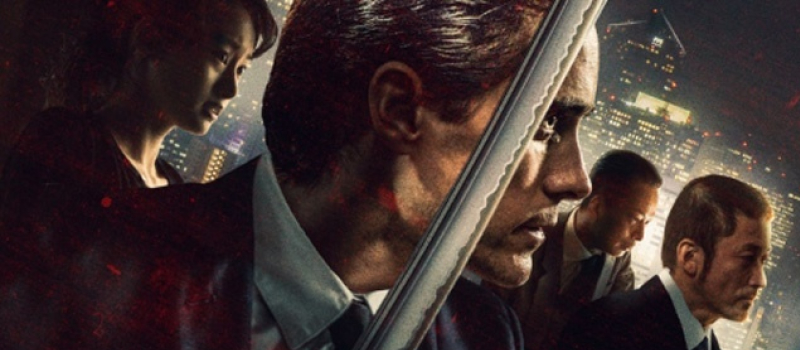Between his role as cosplay Joker and the kimono he wears in Blade Runner 2049, Jared Leto may be a secret Japanophile.
It’s the only way I can rationalise his involvement in The Outsider, a Netflix Original that falls firmly into the category of “they/we probably should have known better”.
Leto stars as Nick Lowell, a mysterious American ex-serviceman who, in 1954, is let out of an Osaka prison after coming to the aid of a Yakuza. Clearly unwilling to give Leto a character with which to indulge his Method acting, Andrew Baldwin’s screenplay presents Nick as a cipher: calm, creepy, and competent, but with little to distinguish him from his brethren besides a stunning set of cheekbones. Oh, yeah, and being Caucasian.
He’s a vacant, sociopathic punk, a deadly pretty boy with a Patrick Bateman haircut who, after that initial act of mercy – saving Kiyoshi (Tadanobu Asano) from throttling to death in a prison shower-room – is characterised only by a self-serving sense of loyalty and willingness to commit violence. He offers to abandon Kiyoshi’s sister, a hostess named Miyu (Shiori Kutsuna), whom he’s knocked up, and performs yubitsume (ritual amputation of the little finger as a show of penance) like a man chopping vegetables.
Even just out of prison, Nick manages to convey privilege; sat in the back of a chauffeured Rolls – a millionaire Hollywood actor riding in the back of a vintage status symbol. The Japanese cast who surround him are largely required to either respect or disrespect Nick based on his status as a gaijin (or outsider), until he either proves them wrong by demonstrating superior loyalty or else kills them for their betrayal. The most the film can grant him in terms of anti-hero status is that he’s not a racist; unlike a scruffy, charming GI played by Emile Hirsch, the sole unsatisfying clue to Nick’s past, who might at least have made for a more engaging protagonist.
Martin Zandvilet’s direction is quietly proficient, bringing a noirish atmosphere but little individual character to proceedings. A scene where rival clans stare impassively at each other across a sumo arena hints at the film’s main issue: The Outsider is only interested in ritual, not culture. There are the expected displays of respect and humiliation, punctuated by brutal violence, but this is, for the most part, a generic gangster film tooled up with daishō blades. Nick could have been broken out of a gulag and be getting a vory tattoo, rather than a koi carp, or specifically giving people Colombian neckties rather than just cutting their throats.
The post-war time period and the seedy, sub-industrial environs are the same as those documented in the Battles Without Honour and Humanity series, but lack the rowdy exploitation style – pinging bullets and furious hysteria – that might have given the film some sense of urgency. The Outsider is simultaneously too respectful in its depiction and too lacking in insight – call it Battles Without Humanity and Limited Honour or The Godfather sans honorific.
With less polish and more nuance, The Outsider might have transcended its deeply flawed “white guy becomes the best Yakuza/Samurai/whatever/etc.” premise, but the film is too corporate, too self-satisfied. It’s ironic that the central conflict comes from a refusal to be assimilated when whatever ambitions the film may have had – Takashi Miike was slated to direct at one point with Tom Hardy to star – have been swallowed up by the Netflix model, which prioritises the conceptually interest, e.g. what a subscriber might be willing to click on in passing, over the actually good.
The Outsider is, ultimately, neither; even if Camilla Hjelm’s cinematography very briefly recalls Rodrigo Prieto’s work in Silence. Watch Annihilation instead.
